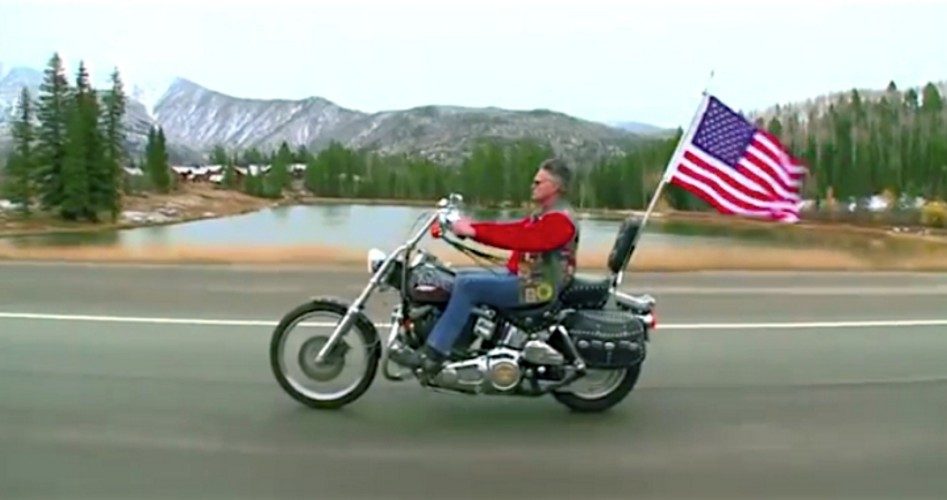
It is difficult to say what precisely is the purpose of Last Ounce of Courage, the patriotic- and Christian-themed film that opened in mid-September around the nation. On the one hand it does emphasize the importance of taking a stand for one’s convictions, and that is good. And it offers the warning that the God-given rights upon which our nation was founded — namely the freedom of religious expression — are being eroded by groups who have made it their aim to subvert the spirit of the Constitution. Also good.
Unfortunately, the film serves to re-enforce the fiction that the good men and women who have fought and died in Iraq and Afghanistan over the past decade as U.S. military personnel were somehow protecting America’s hard-wrought freedoms. Mixed with that idea is the notion that taking a stand for faith requires that one also take a firm stand for the right of a community to post a Christmas tree in front of the City Hall and hang seasonal ornaments about town.
Mostly, it seems Last Ounce of Courage is an attempt to capitalize on the emotions and sentiments that have risen to the surface during this election cycle by floating a movie that pushes all the right buttons for the Evangelical Christians the producers hope will pay to see it. In the process, the movie resorts to thematic clichés, a weak and implausible plot, wooden characterization, and dialogue that often appears detached from the story.
The film’s main character is Bob Revere (Marshall Teague), a Vietnam war hero whose own son was killed while serving overseas (assumedly in the Middle East), leaving a young wife and infant son. Bob understandably takes his son’s death hard, and it is made all the more unbearable when his daughter-in-law and grandson (Nikki Novak, Hunter Gomez) move away, leaving Bob an embittered and brooding man.
Fourteen years later the two return to live with Bob and his wife Dottie (Jennifer O’Neill). Bob is now the mayor of the little community, which the audience is asked to believe has been totally denuded of faith through the efforts of an ACLU-like atheist group. The plot starts to become far-fetched when Bob’s grandson, Christian, gets into big trouble at school when he is discovered carrying around a small Gideon’s New Testament. While the boy gets off with a stern warning from the principal (who confidentially concedes to Bob that the Bible wasn’t really verboten — just politically incorrect), Bob is not so fortunate as the boy challenges him for allowing such a state of affairs in the little town.
“What did my dad die for?” Christian asks his grandfather, a question that soon turns the town on its ear as Bob decides to defy some unknown legal precedent and festoon the town’s city hall and main street with Christmas decorations — which the film stretches to represent an overtly religious expression of faith. “Our freedoms are being taken away from us, one by one,” a defiant Bob Revere declares, “and we’re taking them back, one at a time.” In case the viewer doesn’t understand where this is headed, the filmmakers include a cameo by “conservative” pundit Bill O’Reilly sounding off about the “war on Christmas” that the media hyped into a major cultural crisis a couple of years ago.
Before long the film drastically overreaches, portraying Bob’s actions in supervising the erecting of a giant Christmas tree on city property — along with stringing Christmas lights, angels, and such along Main Street — as somehow illegal, criminal, and worthy of his removal from office by a concerned town council. The tension is ratcheted up by the implausible appearance of the head of the ACLU-like organization, an ominous cigar-chomping lawyer (played by Fred Williamson) vaguely resembling Johnny Cochran, who arranges for the Christmas tree to be unceremoniously pulled down with truck and chain, and for Bob to be arrested and hauled off to jail following his last act of defiance — rehanging a giant cross at the town’s gospel mission.
Meanwhile, one of the movie’s most annoying side stories takes center stage as a group of precocious teens from the high school secretly plot to highjack the school’s winter musical — a secularized, space-alien version of the Christmas story — and actually turn it into the biblical account of Christ’s birth, risking expulsion if not criminal indictment. The action quickly reaches an absurd and audience-confusing crescendo as Bob’s grandson interrupts his fellow students in the middle of their outlaw Christmas pageant, walking onstage with a flag and a long-lost video of his late father to teach the town an unforgettable and emotional lesson about what it means to live — and die — for what one believes in.
While there are certainly some touching scenes in the movie that speak to the importance of reconciliation, forgiveness, and of honoring those who have paid the ultimate sacrifice in service to their country, ultimately Last Ounce of Courage is little more than a ham-handed, poorly executed attempt at playing to the emotions of Christian Americans angry and worried over the ongoing attack on their faith.
In short, the film is a near-perfect caricature modeling the severe shortcomings that often define the Christian movie genre. One can envision it being used someday by a film professor at a Christian university as a cautionary tale for budding film makers who desire to incorporate their faith into cinema.
Photo: Bob Revere (Marshall Teague) rides his flag-adorned motorcycle in Last Ounce of Courage.



